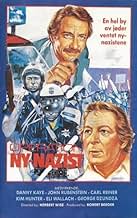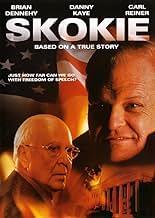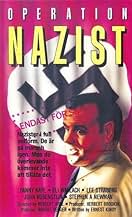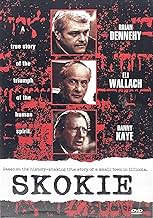VALUTAZIONE IMDb
7,2/10
461
LA TUA VALUTAZIONE
Aggiungi una trama nella tua linguaA dramatization of the controversial trial concerning the right for Neo-Nazis to march in the predominately Jewish community of Skokie.A dramatization of the controversial trial concerning the right for Neo-Nazis to march in the predominately Jewish community of Skokie.A dramatization of the controversial trial concerning the right for Neo-Nazis to march in the predominately Jewish community of Skokie.
- Regia
- Sceneggiatura
- Star
- Candidato a 3 Primetime Emmy
- 2 vittorie e 4 candidature totali
Recensioni in evidenza
Danny Kaye again showed his talents as a brilliant dramatic actor in this 1981 television movie.
He plays a Holocaust survivor who has settled in Skokie, Illinois after the war. Skokie has become a predominantly Jewish town and the serenity of the area is threatened with the Nazi garbage threatening to march through the town to cause the reopening of nightmarish wounds, fear and trepidation among the Jewish citizenry of the town.
As the spokesman, Kaye conveys those fears but is adamant that the garbage shall not march. His voice is etched with unbelievable feeling as he will do anything in his power to thwart the threatened march.
As the Nazi leader leading such a march, George Dzundza is quite effective as Nazi Frank Collin. Filled with hatred, and contempt for humanity, Dzundza also etched an unforgettable character. Of course, the picture belongs to Kaye and he received an Emmy nomination for best actor for it.
There is only so much that an afflicted people can take- 1st amendment rights or not.
He plays a Holocaust survivor who has settled in Skokie, Illinois after the war. Skokie has become a predominantly Jewish town and the serenity of the area is threatened with the Nazi garbage threatening to march through the town to cause the reopening of nightmarish wounds, fear and trepidation among the Jewish citizenry of the town.
As the spokesman, Kaye conveys those fears but is adamant that the garbage shall not march. His voice is etched with unbelievable feeling as he will do anything in his power to thwart the threatened march.
As the Nazi leader leading such a march, George Dzundza is quite effective as Nazi Frank Collin. Filled with hatred, and contempt for humanity, Dzundza also etched an unforgettable character. Of course, the picture belongs to Kaye and he received an Emmy nomination for best actor for it.
There is only so much that an afflicted people can take- 1st amendment rights or not.
One of the better TV movies ever made about a current political issue. The issues are dramatized vividly - freedom of assembly vs. the rights of a community. The performances are consistently excellent. I would especially cite Danny Kaye, whose portrayal of quivering outrage is one of the great moments of his wonderful career. I was interested to read about the career of the screenwriter, Ernest Kinoy. Among his many credits are a couple of episodes of the excellent short-lived series "The Senator" (part of "The Bold Ones"), very much a "ripped from the headlines" series. So too with this movie.
This film is based on actual events that occurred around 1977-1978 in the small village town of Skokie which is located in Cook County, Illinois, United States, neighboring the City of Chicago's northern border. It is a story about a group of National Socialist Party of America v. Village of Skokie, 432 U. S. 43 (1977), arising out of what is sometimes referred to as the Skokie Affair, which was a landmark decision of the US Supreme Court dealing with freedom of speech and freedom of assembly.
The film concentrates more or less on the disgust of the majority of the towns residents who wanted no part of the likes of the National Socialist Party who threatened to lead a parade through the village of Skokie in their Neo Nazi uniforms wearing swastikas.
As like most people who have learned about the Holocaust I can appreciate how any reminder of that period of time in our history although never to be forgotten should not be glorified by any party or individual. This may be a film that circles the drain about free speech, but the only speech that was prevalent was angry and long winded and took away from the critical point between two groups of very different opinions.
Some very distinguished actors provided the film its credibility but I believe the film would have been better with fewer long winded speeches from only one side of the conversation.
I give the film a passable 5 out of 10 IMDb rating.
The film concentrates more or less on the disgust of the majority of the towns residents who wanted no part of the likes of the National Socialist Party who threatened to lead a parade through the village of Skokie in their Neo Nazi uniforms wearing swastikas.
As like most people who have learned about the Holocaust I can appreciate how any reminder of that period of time in our history although never to be forgotten should not be glorified by any party or individual. This may be a film that circles the drain about free speech, but the only speech that was prevalent was angry and long winded and took away from the critical point between two groups of very different opinions.
Some very distinguished actors provided the film its credibility but I believe the film would have been better with fewer long winded speeches from only one side of the conversation.
I give the film a passable 5 out of 10 IMDb rating.
10Jreesing
To me, this was an excellent movie. This was one of my favorite movies of all time. Forget Schindler's list, to me this movie was a much better in certain aspects for emotion. One of the best scenes in this motion picture (one that in the 4 minutes it takes to play invokes more emotion from me as the viewer than all Schindler's list) is where Danny Kaye as Max Feldman answers his daughter's question about what happened to her grandparents. Max and his wife - holocaust survivors, have kept the horrors of the camps from their daughter. She has very little knowledge of what happened and at 13 or 14 she asks questions. Danny Kaye (Max) takes the time (against his wife's wishes) to finally tell his daughter. The strength and power of this single scene rests with the unemotional and matter of fact way that Max explains the nature of the death camp to his daughter. No emotion on the part of Max - - the character is breaking up inside yet is telling his daughter what the Nazis did to his parents in a manner to spare her the emotion. This while his wife is listening from around the corner quietly falling to pieces. You know the deep emotion that he has with the issues when he attends a meeting to discuss the question of Nazi's marching in Skokie with the vehemence and passion he holds on the issue. Yet he holds back this emotion with his daughter. Like I said, this few minutes of the movie is more powerful than the total Schindler's list - in my opinion. The full movie has its flaws, and covers the 1st amendment issues of American Nazi's right to march in detail, covering all sides of the issue. But this is a powerful movie and shows the depth of Danny Kaye's acting talents. A very surprising made for television movie about a very interesting topic. It is well done and very unlike Hollywood today.
If you are a lawyer or a judge that is interested in a documentary movie that talks about a case and what happened, this you will like Skokie. There really isn't any great acting in it, in fact a lot of the dialogue of Kaye is cheesy and overly dramaiszed. Most roles are one dimensional and overplayed, but the director did convey the message of the trial and the consequences that followed.
If you need to do a report on the Skokie trial, and you want your research to be somewhat entertaining then this movie may serve you a very good purpose, other than that I wouldn't recommend it.
If you need to do a report on the Skokie trial, and you want your research to be somewhat entertaining then this movie may serve you a very good purpose, other than that I wouldn't recommend it.
Lo sapevi?
- QuizThis would be the final appearance of Danny Kaye before motion picture cameras, and the last of only two dramatic performances. The other performance being the "Ragpicker," in the 1969 film La pazza di Chaillot (1969) starring Katharine Hepburn.
- BlooperOne actress seen in the synagogue protesting the Nazi march is seen later in the ACLU office answering phones and defending the Nazi march.
- Citazioni
Max Feldman: If the Nazis march in here in Skokie, you can believe me I will be there. I will be there with baseball bats, with a gun, with anything. I will be in Skokie if the Nazis will march.
- ConnessioniFeatured in The 34th Annual Primetime Emmy Awards (1982)
I più visti
Accedi per valutare e creare un elenco di titoli salvati per ottenere consigli personalizzati
Dettagli
Contribuisci a questa pagina
Suggerisci una modifica o aggiungi i contenuti mancanti



































